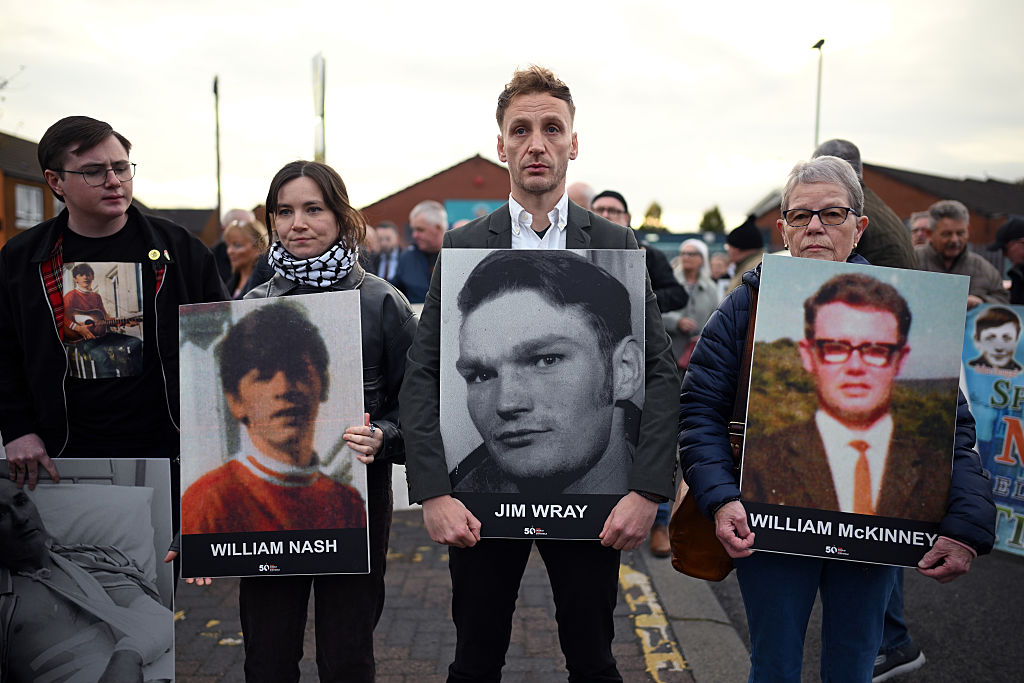The British State Has Prevented Justice for Bloody Sunday
A British court has acquitted the only soldier to face trial over the Bloody Sunday massacre in Derry in 1972. The outcome is no vindication of “Soldier F” or of the British establishment, whose long cover-up made a successful prosecution so challenging.

Families and supporters of the victims march to court in anticipation of the verdict in the trial of Soldier F on October 23, 2025, in Belfast. (Charles McQuillan / Getty Images)
The acquittal of Soldier F at Laganside Crown Court is a moment that demands clarity, honesty and courage. His trial was long delayed, tightly focused and ultimately unsuccessful — but it has not altered the truth of what happened on the streets of Derry in January 1972. Today’s verdict does not exonerate the actions of Soldier F, nor does it rewrite history. What it does is expose, once again, the catastrophic failure of the British state to investigate its own crimes and to hold its agents to account.
In July 2021, commentator Douglas Murray wrote in the Spectator: “It always seemed to me that if anyone was deserving of prosecution, then it was him. . . . F started lying from the moment the shooting stopped.” It is a rare moment when families, campaigners, and a journalist who has long defended state force find themselves in agreement. Yet here, Murray identified something undeniable: Soldier F’s conduct — both on Bloody Sunday and in later attempts to conceal it — was indefensible.
And yet, in 2025, after decades of delay, Soldier F walks away without conviction. That outcome must be understood not through the narrow frame of a single trial but through the wider reality of state obstruction and state impunity.
His Honour Judge Patrick Lynch, applying the law as it stands, acquitted Soldier F. The court was confronted with evidential gaps that were neither accidental nor unavoidable. The standard of proof in a criminal court is high, and it should be. But it is also true that the evidential collapse in this case flowed directly from the fact that there was no proper investigation at the time of the killings and no sincere effort to conduct one for decades afterwards. This was not a failure of memory. It was a failure of will.
In the immediate aftermath of Bloody Sunday, neither the Royal Ulster Constabulary nor the British Army sought to gather evidence, preserve testimony, secure a scene, interview soldiers as suspects, or treat the dead and wounded as victims of crime. The collapse we witnessed in court was seeded in 1972 and fertilised for half a century by a state that had no appetite for the truth and no intention of prosecuting its own.
Bloody Sunday is the most notorious example of state violence in the North — but it is not unique. Across the North of Ireland, hundreds of families bereaved by the British state faced the same brick wall: no investigation, no disclosure, no accountability.
The message from the state apparatus was unmistakable — British soldiers would not be pursued, no matter the evidence, no matter the dead. This was not the rule of law. It was rule by exemption. The consequences have lasted generations.
In the 1998 Bloody Sunday Inquiry, its chairman, Lord Saville, confirmed that the killings on Bloody Sunday were “unjustified and unjustifiable.” Yet Saville did not, and could not, undo decades of state neglect and suppression. Because the state chose cover-up over accountability, prosecutors half a century later were left to build a case with the scorched remnants of evidence that should have been gathered and preserved when the truth was fresh, the witnesses young, and the responsibility unavoidable. The result was predictable. Indeed, for many in the system, it was preferable.
In contrast to the conduct of state agencies, the families of Bloody Sunday have acted with dignity, endurance, and a moral clarity that has inspired people across Ireland and beyond. Their persistence forced a British prime minister to admit the truth. Their bravery exposed a lie that had been maintained at the highest levels of the state. Their campaign for justice has resonated with countless other families, including my own, who know what it means to confront a system built to deny them.
These families did not ask for revenge. They asked for truth, accountability, and respect for the rule of law. They got truth — but were denied accountability by those who buried it for decades.
Mistrust exists that the British government still hopes to close the book with new legislation and national security vetoes. It wants fatigue to do what Saville did not and what the families will not: end the pursuit of justice on their terms.
The verdict in Belfast is not the end of the Bloody Sunday story. It is merely the latest chapter in a decades-long struggle between truth and concealment, between families seeking accountability and a state that denied it.
Soldier F’s acquittal does not vindicate him. It indicts the system that protected him. It exposes a state that investigates everyone except itself. And it proves that impunity — not justice — was the unofficial policy of the day.
The families stood for the rule of law when the state abandoned it. They held fast to dignity when the state traded in distortion. They pursued truth when the state offered silence.
Their fight continues. And they will be remembered not for what was denied to them in court, but for what they achieved against every obstacle placed in their way.